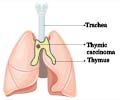Thymus, a gland that is responsible for teaching immune system cells known as T cells how to attack and fight off infections.
"My baby is doing what other babies her age are doing -- she's feeding herself, putting on her own clothes and she loves to dance."
Lolita Harding is describing her daughter Dave'yana, who will turn three in September, thanks in large part to a thymus transplant she received at Duke University Medical Center in April 2005 to reconstitute her absent immune system. Dave'yana was the 31st baby to receive such a transplant at Duke to correct immune system deficiencies caused by a condition called DiGeorge anomaly. Duke is the only center in the world that performs the procedure.The latest results of Duke's experience with this treatment of DiGeorge anomaly, published Tuesday, May 15, in the journal Blood, show that 75 percent of the babies who received a thymus transplant were alive after one year. The recipient of the first transplant, in 1994, is alive and well.
The current study was supported by the National Institutes of Health and the Food and Drug Administration.
DiGeorge anomaly is marked by the lack of a functioning thymus, a gland that is responsible for "teaching" immune system cells known as T cells how to attack and fight off infections. Babies with DiGeorge anomaly also can have a range of problems including heart defects and unusual facial features. However, about 1 percent of these babies have no thymus at all, a situation that ends in death, usually by infection. These are the patients who are candidates for thymus transplantation.
"We want people to know that when the diagnosis of complete DiGeorge anomaly is made, it is no longer a death sentence," said pediatric immunologist Louise Markert, M.D., Ph.D., who developed the procedure. "There is a treatment available - thymus transplantation - that has led to survival of most of the infants who otherwise would have died."
For the procedure, surgeons obtain thymus tissue that usually is discarded from babies undergoing heart surgery. Since the gland is large and covers the heart in infants, surgeons must remove all or part of it to gain access to the heart. The removed thymus tissue is grown in culture for several weeks in a laboratory while researchers ensure that there are no diseases present in the tissue. Strips of tissue are then implanted in the baby's thigh, where they attract a blood supply and begin to act like a thymus gland. Within three to four months, mature T cells begin to appear in the bloodstream.
Advertisement
Markert said the 12 deaths occurred within one year of the transplant. The deaths were caused by various infections and were not a result of the surgery itself, she said.
Advertisement
Typically, children remain in the hospital for two to three months after transplantation as physicians work to keep infections at bay as the child's immune system develops. In Dave'yana's case, Harding returned to the hospital in Missouri after about a month. She received treatment for a viral infection at the Children's Hospital of St. Louis for four months after which her immune system was strong enough to get rid of the virus and prevent other infections. Dave'yana then went home.
"If it wasn't for Dr. Markert and her team, my baby would not be here right now," Harding said. "They really fought for my baby to get the transplant."
Whether she likes it or not, later this month Dave'yana, because of her new immune system, gets to experience what other children her age face -- standard childhood immunization shots.
Source-Duke University
LIN/B








